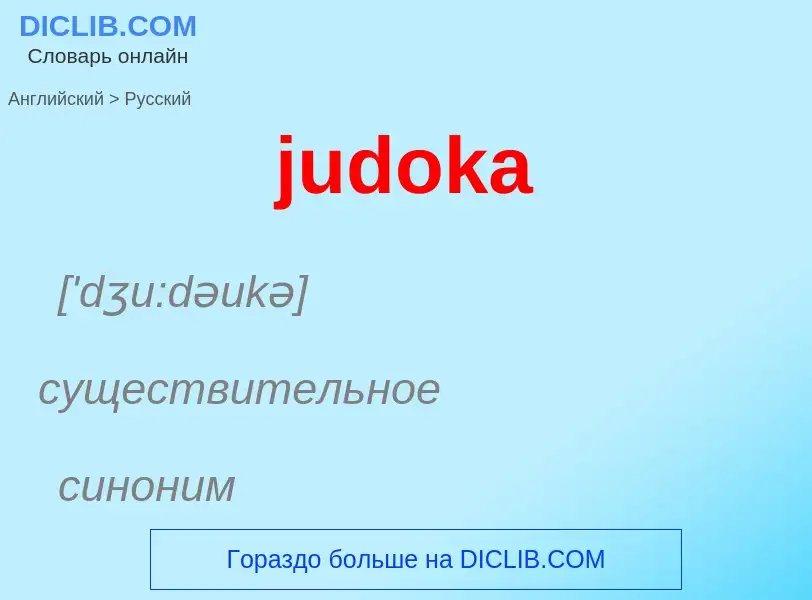Tradução e análise de palavras por inteligência artificial ChatGPT
Nesta página você pode obter uma análise detalhada de uma palavra ou frase, produzida usando a melhor tecnologia de inteligência artificial até o momento:
- como a palavra é usada
- frequência de uso
- é usado com mais frequência na fala oral ou escrita
- opções de tradução de palavras
- exemplos de uso (várias frases com tradução)
- etimologia
judoka - tradução para russo
['dʒu:dəukə]
существительное
синоним
['dʒu:dəuist]
существительное
общая лексика
тренер по борьбе дзюдо
дзюдоист
Definição
Wikipédia
.jpg?width=120)
Judo (Japanese: 柔道, Hepburn: Jūdō, lit. 'gentle way') is an unarmed modern Japanese martial art, Olympic sport (since 1964), and the most prominent form of jacket wrestling competed internationally. Judo was created in 1882 by Kanō Jigorō (嘉納 治五郎) as an eclectic martial art, distinguishing itself from its predecessors (primarily Tenjin Shinyo-ryu jujutsu and Kitō-ryū jujutsu) due to an emphasis on "randori" (乱取り, lit. 'free sparring') instead of "kata" (pre-arranged forms) alongside its removal of striking and weapon training elements. Judo rose to prominence for its dominance over established jujutsu schools in tournaments hosted by the Tokyo Metropolitan Police Department (警視庁武術大会, Keishicho Bujutsu Taikai), resulting in its adoption as the department's primary martial art. A judo practitioner is called a "judoka" (柔道家, jūdōka, lit. 'judo performer'), and the judo uniform is called "judogi" (柔道着, jūdōgi, lit. 'judo attire').
The objective of competitive judo is to throw an opponent, immobilize them with a pin, or force an opponent to submit with a joint lock or a choke. While strikes and use of weapons are included in some pre-arranged forms (kata), they are not frequently trained and are illegal in judo competition or free practice. Judo's international governing body is the International Judo Federation, and competitors compete in the international IJF professional circuit.
Judo's philosophy revolves around two primary principles: "Seiryoku-Zenyo" (精力善用, lit. 'good use of energy') and "Jita-Kyoei" (自他共栄, lit. 'mutual welfare and benefit'). The philosophy and subsequent pedagogy developed for judo became the model for other modern Japanese martial arts that developed from koryū (古流, traditional schools). Judo also spawned a number of derivative martial arts around the world, such as Brazilian jiu-jitsu, Krav Maga, sambo, and ARB. Judo also influenced other combat styles such as close-quarters combat (CQC), mixed martial arts (MMA), shoot wrestling and submission wrestling.

.jpg?width=200)

![[[Jigoro Kano]] and [[Yamashita Yoshitsugu]] performing ''Koshiki-no-kata'' [[Jigoro Kano]] and [[Yamashita Yoshitsugu]] performing ''Koshiki-no-kata''](https://commons.wikimedia.org/wiki/Special:FilePath/Hiki-otoshi.jpg?width=200)
![International judo camp in [[Artjärvi]], [[Orimattila]], [[Finland]] International judo camp in [[Artjärvi]], [[Orimattila]], [[Finland]]](https://commons.wikimedia.org/wiki/Special:FilePath/Judo Camp in Artjärvi, Finland.jpg?width=200)
![Two children training in [[judo techniques]] Two children training in [[judo techniques]]](https://commons.wikimedia.org/wiki/Special:FilePath/Judo children.jpg?width=200)


![[[Jigoro Kano]], founder of judo [[Jigoro Kano]], founder of judo](https://commons.wikimedia.org/wiki/Special:FilePath/Kano Jigoro.jpg?width=200)
![Toshiro Daigo]] with an [[uchi mata]] in the final of the 1951 [[All-Japan Judo Championships]] Toshiro Daigo]] with an [[uchi mata]] in the final of the 1951 [[All-Japan Judo Championships]]](https://commons.wikimedia.org/wiki/Special:FilePath/Yoshimatsu vs. Daigo in 1951.jpg?width=200)
![[[All-Japan Judo Championships]], 2007 men's final [[All-Japan Judo Championships]], 2007 men's final](https://commons.wikimedia.org/wiki/Special:FilePath/石井と鈴木.jpg?width=200)
